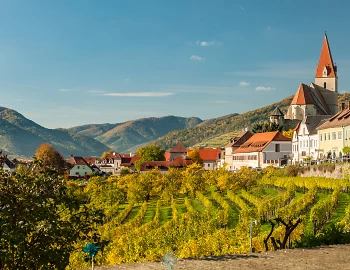
Pannoterra 2019
QWt Burgenland, Salzl Seewinkelhof, 1500 ml

| Grape variety: | Merlot, Zweigelt, Cabernet Sauvignon, Cabernet Franc |
| Producer: | Salzl |
| Origin: | Austria / Burgenland / Neusiedlersee |
| Other bottle sizes: |
Description
Wonderful dark berry fruit nose, cocoa powder, toasty raspberry aroma, black pepper, spice hints, ripe cherries. Powerful body, dark fruity, ripe sour cherries, plums, Mon Chéri, cranberries, roasted berries, fine herbal spice, liquorice, some eucalyptus, black olives, delicate sweetness, velvety tannins, smoky-roasty, juicy acidity, slightly earthy notes with fresh, slightly salty minerality, sturdy, taut, super balanced wine with an elegant, long finish. Pannoterra offers huge potential and 100% drinking pleasure!
Attributes
| Origin: | Austria / Burgenland / Neusiedlersee |
| Grape variety: | Merlot, Zweigelt, Cabernet Sauvignon, Cabernet Franc |
| Ripening potential: | 2 to 8 years |
| Drinking temperature: | 16 to 18 °C |
| Food Pairing: | Spiced grillades, Saddle of lamb fillet with herb jus, Goulash, boeuf bourguignon, Calf's kidneys with mustard sauce, Roast saddle of venison, Spicy hard cheese |
| Vinification: | long must fermentation, fermentation in steel tank |
| Harvest: | strict selection |
| Maturation: | in used barriques |
| Maturation duration: | 18 months |
| Volume: | 14.5 % |
| Note: | Contains sulphites |
Salzl
The Austrian winery Salzl Seewinkelhof is located in Illmitz, surrounded by the picturesque lakes and plains of the Neusiedlersee-Seewinkel National Park in Burgenland. A good hour’s drive from Vienna lies this family winery that also provides comfortable 4-star accommodation in an attached guesthouse with a pool.
The history of the winery dates back to 1840. Josef Salzl restructured the winery in the 1980s, focusing on the production of high-quality red wines and thus laying the foundation for today’s success. Since 2005, his son Christoph has also been fully involved in the operation of the winery. He is taking over the business step by step in order to continue the family tradition. Three generations are currently working hand in hand to produce authentic wines with the greatest passion and care according to the motto “enjoyment and joie de vivre”.
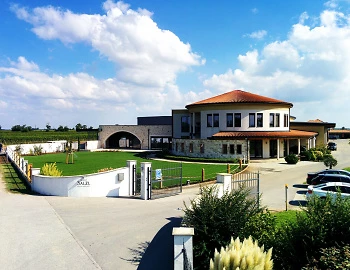
Merlot
Everybody’s darling
Merlot is the most charming member of the Bordeaux family. It shines with rich colour, fragrant fullness, velvety tannins and sweet, plummy fruit. It even makes itself easy for the vintner, as it matures without issue in cool years as well. This is in contrast to the stricter Cabernet Sauvignon, which it complements as a blending partner. Its good qualities have made the Merlot famous worldwide. At over 100,000 hectares, it is the most-planted grape in France. It also covers large areas in California, Italy, Australia and recently in Eastern Europe. The only catch is that pure Merlot varieties rarely turn out well. Its charm is often associated with a lack of substance. Only the best specimens improve with maturity. They then develop complex notes of leather and truffles. This succeeds in the top wines from the Bordeaux appellation of Pomerol and those from Ticino, among others.
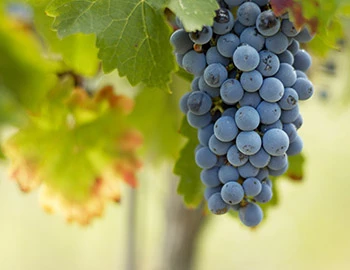
Zweigelt
Flatterer with a backbone
The Zweigelt is an Austrian original. Fritz Zweigelt crossed it in 1922 at the Klosterneuberg Orchard and Viniculture School ("Obst- und Weinbauschule Klosterneuburg") from the red varieties Blaufränkisch and Saint Laurent. Zweigelt's main quality is being marvellously drinkable. With its exuberant berry fruit and juicy structure, it fits like no other to the pleasurable lifestyle of our Austrian neighbours. One thinks, for example, of a hearty Brettjause in the wine tavern. It can, however, also assemble well with other grape varieties, and expand in wooden barrels for more backbone. No wonder it is the most planted grape variety in Austria. One curiosity: the Japanese island of Hokkaido grows 230 hectares of Zweigelt.
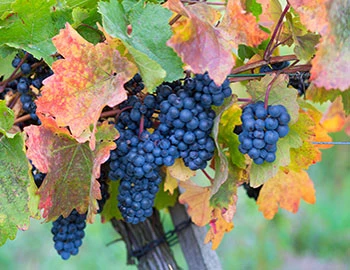
Cabernet Franc
Forefather of the Bordeaux varieties
The Cabernet Franc is one of the oldest varieties of Bordelais and a parent of three other red grapes in the Bordeaux assortment: Cabernet Sauvignon, Merlot and Carmenère. It is distinguished by its complex, flavourful bouquet of raspberry, graphite, violet, liquorice and white pepper. In addition, it presents round, crisp tannins which turn out less strongly than those of Cabernet Sauvignon. While the Cabernet Franc always appears as part of a blend in Bordeaux, it is pressed alone on the Loire. The most renowned appellations are Chinon and Bourgueil. Incidentally, the Cabernet originates not in Bordeaux but in the Spanish Basque Country. Cabernet owes its name to the Latin “carbon”, meaning black.
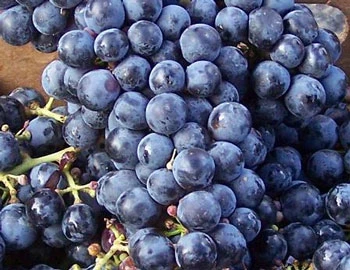
Cabernet Sauvignon
The backbone of Bordeaux
The Cabernet Sauvignon gives the Bordeaux its backbone, yielding deep violet wines with powerful tannins and endless ripening potential. It is the top dog in Médoc, and is placed in all five premier crus of Bordelais. When young, it often appears strict and unapproachable, but with advancing years, its tannins round off. It is wonderfully velvety, and yet always maintains its freshness. Typical flavours include cassis, graphite and cedar. Wherever Cabernet Sauvignon is found, Merlot is not far away. It complements the robust structure of Cabernet with softness, fruit and richness. The Cabernet Sauvignon is the most-exported vine in the world. It delivers persuasive qualities in Italy as an ingredient of the Super Tuscan, or as the flagship variety from California. There, it is lovingly titled “Cab Sauv”. Meat fans should be aware that it fantastically accompanies a grilled entrecôte. The family tree of Cabernet Sauvignon is surprising: its parents are Cabernet Franc and the white Sauvignon blanc.
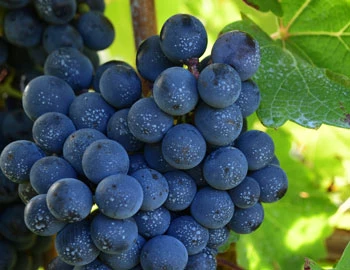
Burgenland
Burgenland: Reds, sweets and other wonders
Burgenland is often referred to in Austria as the new wine world. In fact, wines – with exceptions like the nobly sweet Ruster Ausbruch – were almost entirely unknown here 20 years ago. Today, the most substantial red wines in Austria mature here. And the sweet wine scene is also stronger than ever before. Even the whites – for instance, in the Leitha Mountains – are on the upswing. The basis for this wine wonder are the various terroirs that overlay the land in a complex patchwork.
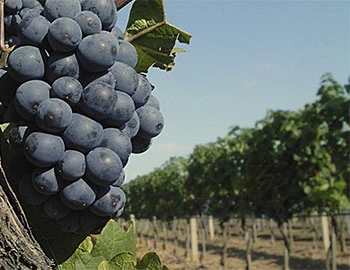
Austria
Austria – Sumptuous culture, accessible to all
Austria is characterized by unbelievable topographical diversity. A flat steppe in the east, forests and hills in the Alpine regions, wetlands and Mediterranean landscapes in the south. This in addition to a rich tradition and even greater love. It’s no surprise that the Romans found joy on this patch of Earth and cultivated wine growing. Austrian wine is not abundant, but it is high quality.
